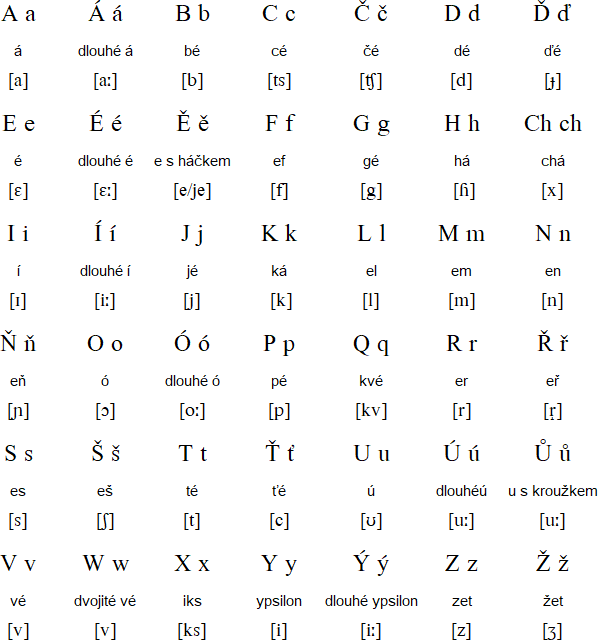See this page in:
Čeština
Czech is a Western Slavic language spoken mainly in Czechia (Česko), which is also known as the Czech Republic (Česká republika), and was formerly part of Czechoslovakia (Československo). In 2012 there were aout 10.5 million speakers of Czech in Czechia.
There are Czech speakers in a number of other countries, including Slovakia - 2.5 million in 2012, the USA - 47,400 in 2015, Serbia - 37,700 in 2009, and Austria - 17,700 in 2003, and smaller numbers of speakers in Croatia, Poland and Romania.
Czech is closely related to Slovak, and more or less mutually intelligible with it. However, since the dissolution of Czechoslovakia, Czechs have less exposure to Slovak, and vice versa. As a result, they may not understand each other as well as before. Dialects spoken in Moravia are closer to Slovak.
The region where Czech is spoken is traditionally called Bohemia (Čechy). It was named after the Boii tribe, who, according to Roman sources, have inhabited the area since at least the 1st century AD. The dialects spoken in Moravia (Morava) are also considered forms of Czech. The language of Bohemia was known as Bohemian until the early 20th century, when it became known as Czech.
Czech first started appearing in writing in the form of glosses and short notes in texts during the 12th and 13th centuries. Czech literature started to appear in the 13th century. The first printed book in Czech, the story of the Trojan war (Příběh o Trójské válce), was published at Pilsen (Plzeň) in 1468. After many years of Austrian rule, during which German was the main language of literature and government, there was a revival of Czech literature at the end of the 18th century.
The most prominent writer during the early period of Czech literature was Jan Hus (1369-1415), a religious reformer who also reformed Czech spelling (české hláskování). He created the system of having one grapheme (letter) for every phoneme (sound) in the language by adding accents (čárka) to some of the letters. As a result, written Czech looks very different from written Polish. For example, in Czech the sound ch, as in church, is written č, but the same sound is written cz in Polish.

Download an alphabet chart for Czech (Excel)
A recording of the Czech alphabet by Zbyněk Bambušek
Recordings in the text by Jan Jurčík
Všichni lidé se rodí svobodní a sobě rovní co do důstojnosti a práv. Jsou nadáni rozumem a svědomím a mají spolu jednat v duchu bratrství.
A recording of this text by Vaclav Dekanovsky
All human beings are born free and equal in dignity and rights. They
are endowed with reason and conscience and should act towards one another
in a spirit of brotherhood.
(Article 1 of the Universal Declaration of Human Rights)
Information about Czech | Useful phrases | Silly phrases | Numbers | Family words | Colours | Weather | Idioms | Tongue twisters | Tower of Babel | Learning materials
Information about the Czech language
http://en.wikipedia.org/wiki/Czech_language
https://en.wikipedia.org/wiki/Czech_orthography
https://en.wikipedia.org/wiki/Czech_phonology
https://en.wikipedia.org/wiki/Czech_conjugation
https://en.wikipedia.org/wiki/History_of_the_Czech_language
https://www.ethnologue.com/language/ces
Online Czech lessons and other resources for learners
http://www.locallingo.com
http://www.czechprimer.org
http://www.videocestina.cz
http://www.myczechrepublic.com/czech_language/
http://www.czech-language.cz/
http://www.digitaldialects.com/Czech.htm
http://www.czechclass101.com/
Learn Czech online with CzechClass101
Learn Czech with Glossika
Learn Czech with Ling
Online Czech dictionaries
http://www.wordbook.cz
http://slovnik.seznam.cz
http://www.slovnik.cz
http://www.online-slovnik.cz
http://prekladacvetonline.cz
https://slovniky.lingea.cz/
Tlumočení a české překlady cizích jazyků
http://tlumoceni.org
Online Czech language radio
http://www.bbc.co.uk/czech
http://www.radio.cz
http://www.rozhlas.cz/english/portal
Online Czech news and magazines
http://www.novinky.cz
http://www.ihned.cz
http://www.halonoviny.cz
http://www.lidovky.cz
Belarusian, Bosnian, Bulgarian, Croatian, Czech, Goral, Kashubian, Knaanic, Macedonian, Montenegrin, Old Church Slavonic, Polish, Russian, Rusyn, Serbian, Silesian, Slovak, Slovenian, Sorbian, Ukrainian, West Polesian
Languages written with the Latin alphabet
Page last modified: 26.09.21
[top]
You can support this site by Buying Me A Coffee, and if you like what you see on this page, you can use the buttons below to share it with people you know.

If you like this site and find it useful, you can support it by making a donation via PayPal or Patreon, or by contributing in other ways. Omniglot is how I make my living.
Note: all links on this site to Amazon.com, Amazon.co.uk
and Amazon.fr
are affiliate links. This means I earn a commission if you click on any of them and buy something. So by clicking on these links you can help to support this site.
[top]
Shipping time world-
wide is typically 6 days.